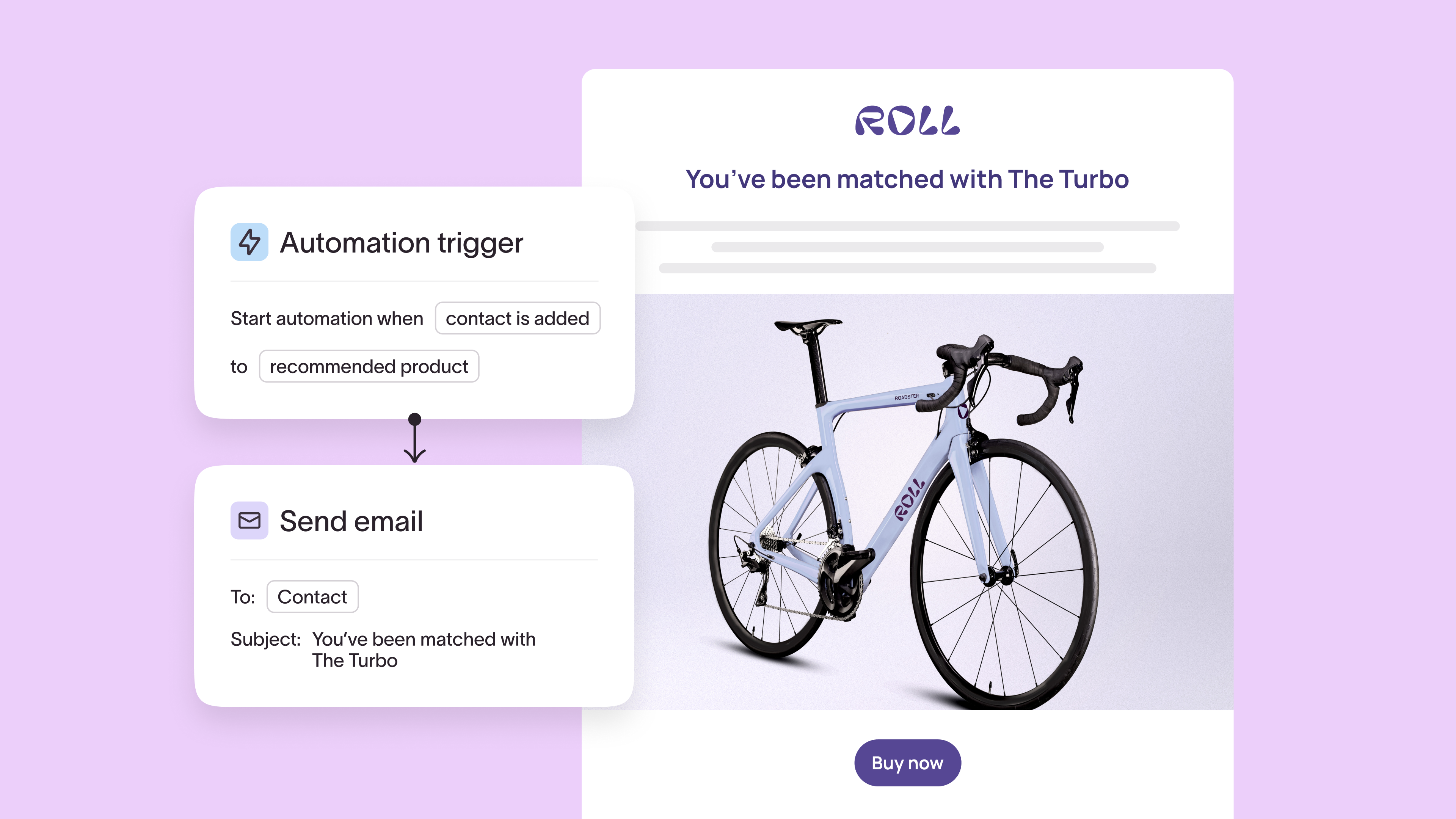7 post-event feedback survey questions that reveal what attendees really think
Want to know what event attendees really thought of your event? Uncover their real feelings with post-event feedback surveys that ask the right questions. Here are seven to help you get started.

When you invest so much time, energy, and money into putting on an unforgettable event, wouldn't you rather know what attendees thought than guess based on assumptions?
Sure, the number of people who attend your event can indicate success, but there's nothing more valuable than post-event feedback straight from attendees... if you can get it.
That’s why it’s so important to ask the right questions—the ones that get attendees to tell you what they really thought of your event.
Asking if someone enjoyed your event is fine, but when you ask more targeted questions (we’ll get into this later), you get more precise feedback.
Like when I surveyed our Typeforum attendees after the event. Feedback was all over the place—from exceedingly positive to statements letting us know we needed to up our game, like:
- "I enjoyed hearing from real customers. It made me think differently."
- "For those of us who are more advanced, a lot of this stuff that was covered in the breakout sessions was stuff we already know how to do."
You can increase response rates while collecting valuable feedback and actionable insights by asking the right questions, the right way.
87% of customers say they reveal deeper insights from data after switching to Typeform.
That’s why I’m sharing event feedback survey best practices and the seven best post-event feedback questions to ask after your event. Feedback you can actually learn something from.
The 7 post-event feedback survey questions that matter most
Not sure how to collect event feedback effectively? Start by asking these seven questions—they help you discover what attendees really thought of your event and give you insights into how you can optimize future events.
1. How would you rate your overall experience at this event?
Asking attendees to rate their experience is perhaps one of the most important post-event feedback survey questions you can ask. Why? It helps you understand high-level sentiment and acts as a starting point for deeper follow-up questions.
You can even follow up automatically with contextualized AI-driven questions, like this:
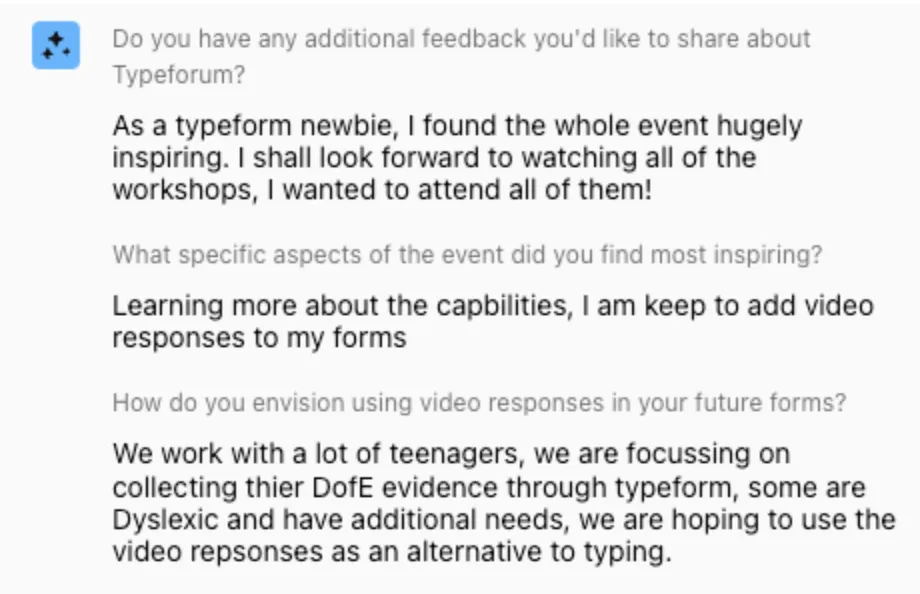
You might ask attendees to rate:
- Date and time
- Speakers
- Venue
- Session or workshop quality
- Amount of sessions (if it's a multi-session event)
Rating their experience is the perfect first question because of its easy-to-answer format—survey-takers simply choose a number or statement that reflects their overall impression.
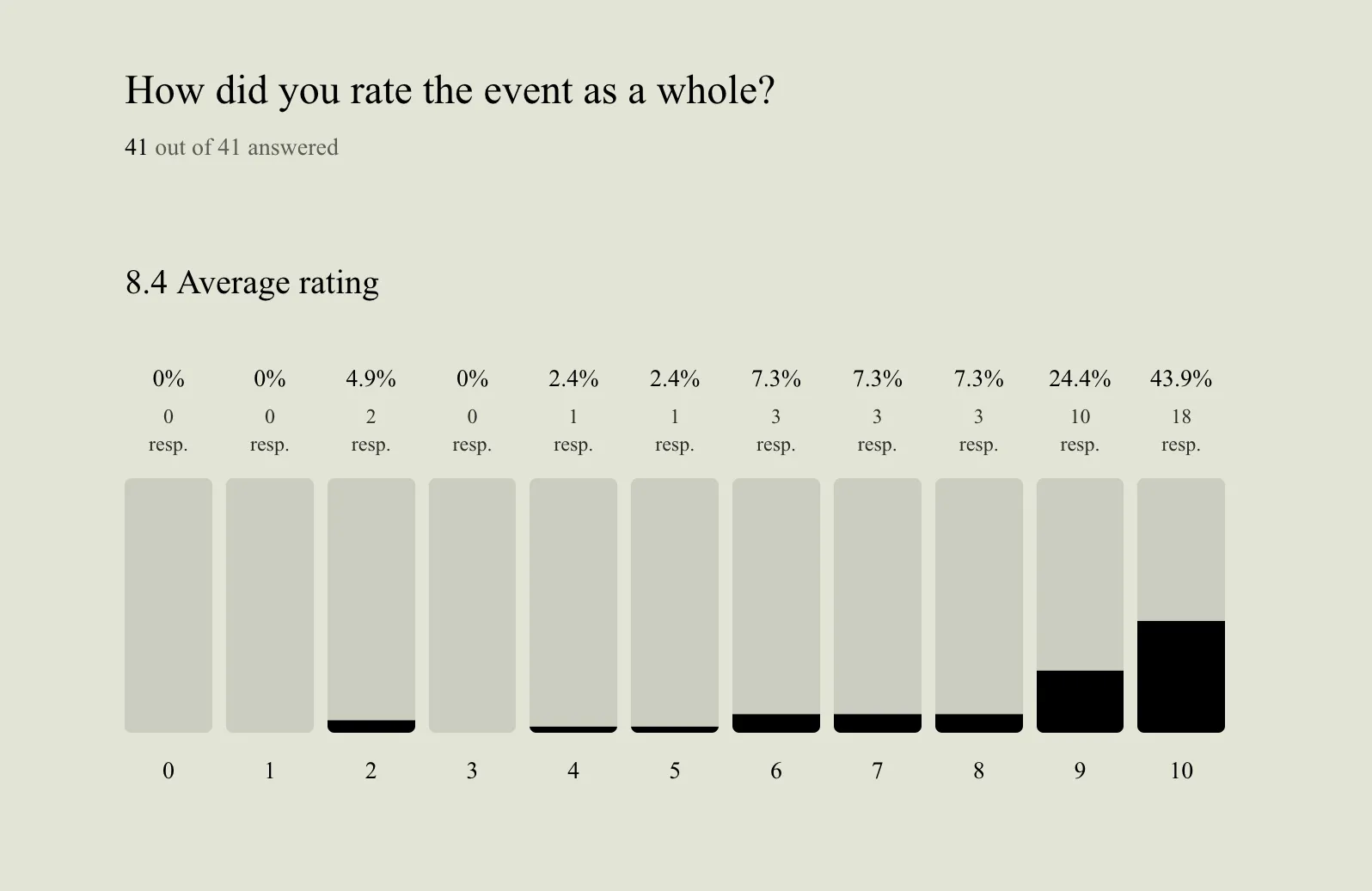
We used this question in our post-event feedback survey for our recent Typeforum event. I got insights into the attendee experience—and earned an average 8.4/10 satisfaction score. It also showed us how many attendees gave us a 10 (the majority), revealing the level of satisfaction.
Optimize it
Remember when we talked about the right way to ask? If you want to capture more than just overall sentiment, use a Likert scale question. It gives survey-takers a range of options on a scale to evaluate their experience, like this:
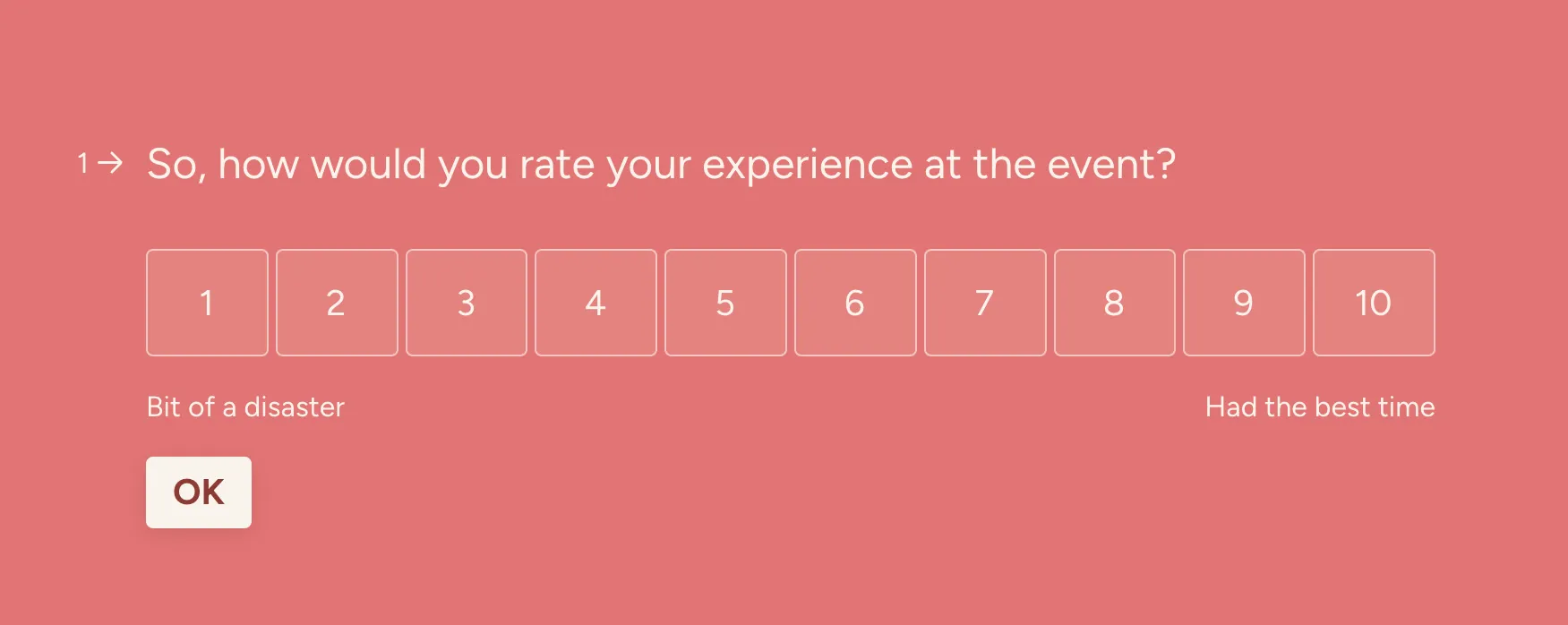
Notice how 1 and 10 represent opposite ends of the spectrum, but event attendees can choose any number in between to show how much (or how little) they enjoyed your event? You're giving them more options that’ll paint a clearer picture of their experience.
2. What part of the event was most valuable to you?
Getting a general idea of what attendees thought of your event is helpful. But go a level deeper and ask what they got the most value from.
By asking for something specific, you can narrow down what you did well, identify which parts of your event resonated most with attendees, and learn what they'd like to see again at future events.
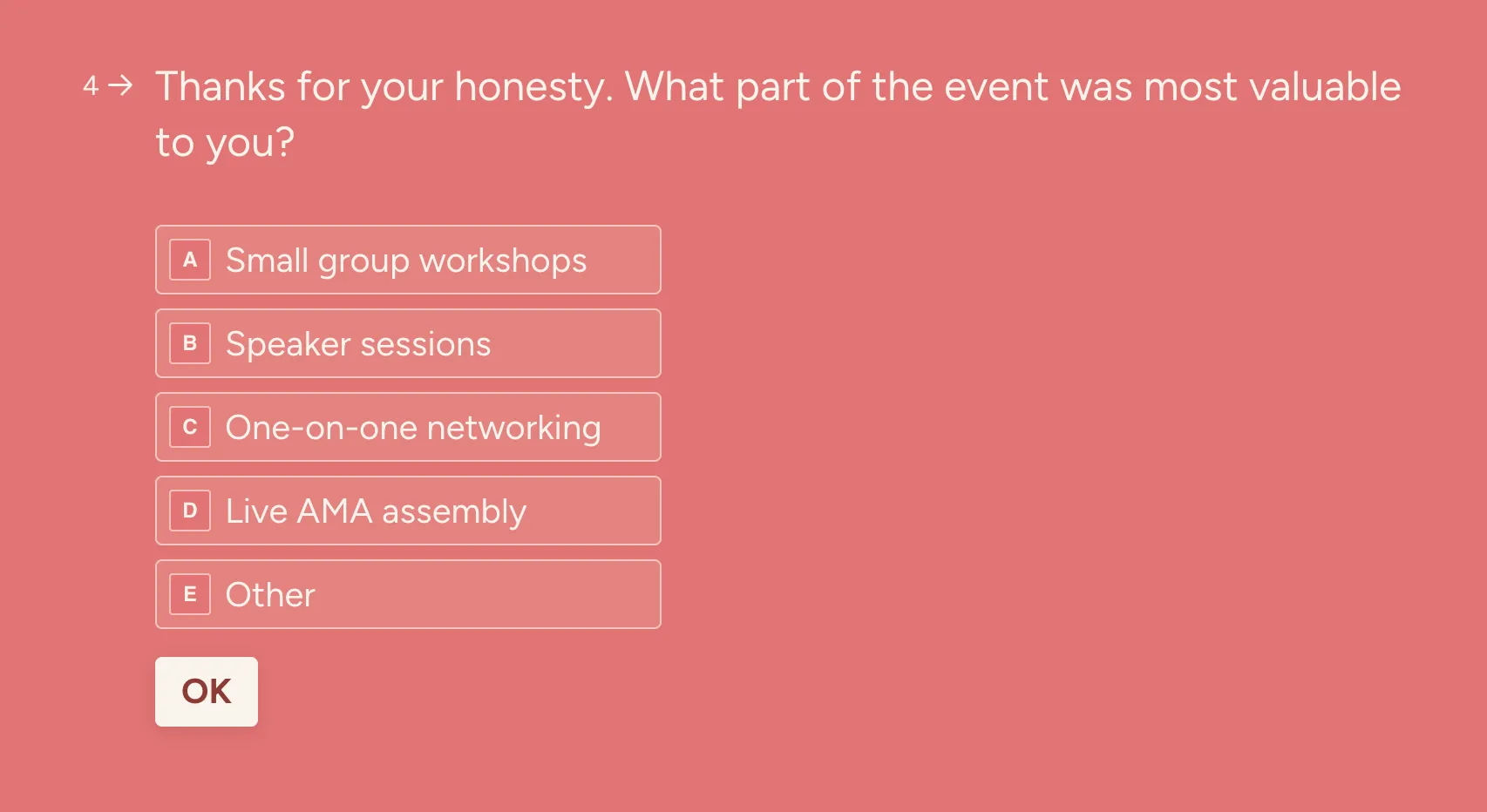
I asked a similar question in my Typeforum feedback survey and the results showed that an overwhelming 70% of attendees get the most value from how-to workshops. So, what will be a big part of our events moving forward? You guessed it—how-to workshops.
Keep it simple by using a multiple-choice question that lets survey-takers choose an option without having to type out an answer (like with open-ended questions).
Pro tip: Include an open-ended "Other" option that lets attendees explain in their own words what they enjoyed most.
Optimize it
Personalize your post-event feedback survey by using conditional logic to route attendees to different questions based on their answers.
Let's say a survey-taker selects "Speaker sessions" as the most valuable part of the event. Logic sends them to the next question that asks which speaker was their favorite. But others who selected another option would get sent to a different, more relevant question.
Pro tip: Who says multiple-choice can't include images? Use picture-choice to visualize each option and create an aesthetic UX.
3. Was there anything you felt was missing?
Not every event is going to wow every attendee—and that's okay, that's what post-event feedback is for. Criticism can be hard to hear but think of the feedback you're collecting as a tool to create better events that resonate more with your audience.
Take this feedback, for example. One of our Typeforum attendees shared that, "it was very difficult to hear what your employees said. Consider subtitling." By asking the right question, we uncovered a crucial piece of feedback to make our events more accessible.
Ask attendees what they thought was missing from the event to uncover any gaps or pain points you can address with future events.
Optimize it
While multiple-choice questions work well for more surface-level insights, open-ended questions let survey-takers expand on their feedback—in their own words.

It might be harder to identify trends or patterns from answers to open-ended questions, but individual qualitative feedback can still be valuable and help you learn more about your audience.
4. Did the event meet your expectations? Why or why not?
Did attendees get what they thought they were going to get at your event? If not, you may have overpromised and underdelivered.
But if post-event feedback shows that your event overwhelmingly met or exceeded their expectations, you did something right. Likely effective marketing.

The event experience should align with your event marketing. Asking attendees if the event met their expectations will help you understand if your marketing was off or if it did a good job of setting realistic expectations.
Optimize it
Instead of trying to ask two questions at once, ask attendees whether your event met their expectations. Then, use logic to lead them to the next question that gives them space to explain why or why not.
By using logic, you can also build empathy into your post-event feedback surveys by adding a statement before the question, like this:
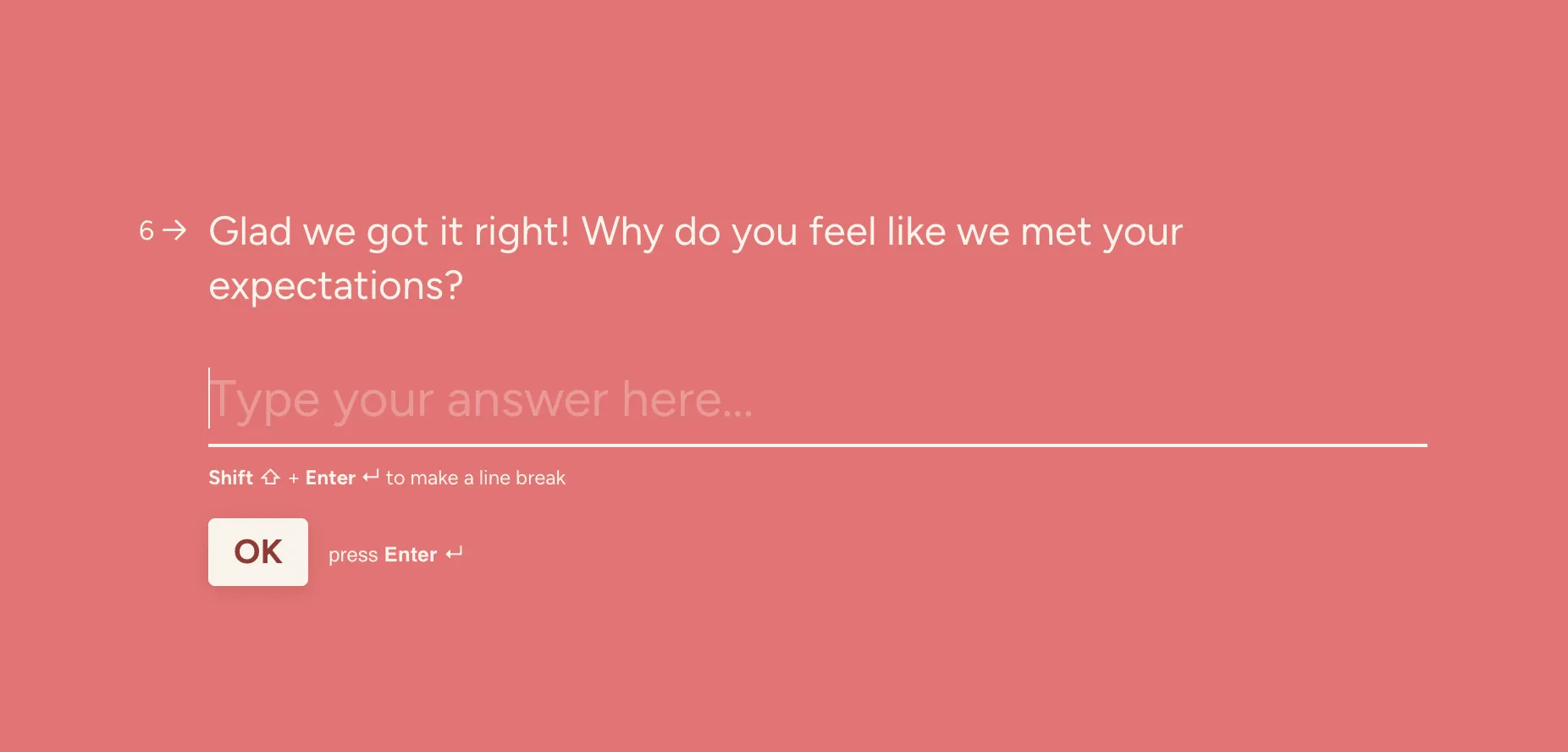
5. How likely are you to attend another one of our events?
Event attendees may be satisfied with the event they just attended—but would they come back? Asking attendees how likely they are to attend other events evaluates loyalty and can help gauge their interest in future events.
Their answers to, "How likely are you to attend another one of our events?" help you figure out if you did a good job establishing your brand as an industry authority and a company that puts on events worth their time.
Optimize it
Give survey-takers a range of options instead of simply asking whether they'd attend future events. Using an opinion scale question gives you more clarity into the likelihood that they'd come back.
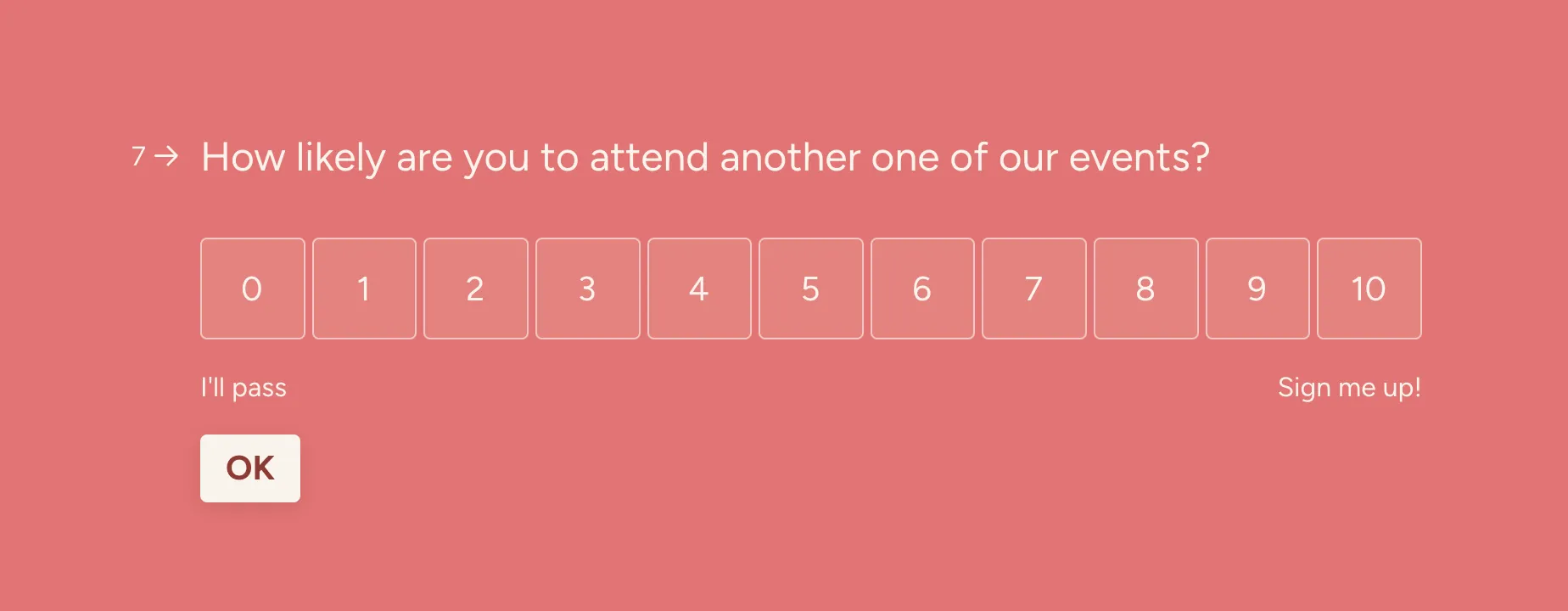
And you can follow up with an open-ended question about what would encourage future attendance to gather even more actionable post-event feedback.
6. Would you recommend this event to a friend or colleague?
When you started planning your event and driving people to your event registration form, you probably found reviews from reputable sponsors and speakers. You might even have testimonials from attendees who attended previous events.
And you probably shared that social proof to build credibility and garner more sign-ups. Why? To leverage word-of-mouth marketing—88% of people trust recommendations from people they know.
This event's attendees could be the catalyst for future word-of-mouth marketing if they share that they'd recommend your event (a clear indicator of overall success).
Optimize it
Use a net promoter score (NPS) question to measure how likely attendees are to recommend your event. Using a scale shows you if there's room for improvement instead of a binary "Yes/No" answer.

For example, someone might rate their likelihood at a 7. While that's a generally positive score, it tells you that there are a lot of things you can do better to increase attendee satisfaction.
Pro tip: If they're very likely to recommend your event, ask a follow-up question asking for a testimonial.
7. Any other feedback you’d like to share?
We're only human—we want to feel like our opinions matter. Post-event feedback surveys build trust and show attendees you value what they have to say and genuinely want to create better events in the future.

But, no matter how good your questions are or how many you ask, the best feedback you'll get will come from asking for an attendees' unfiltered thoughts.
These open-ended and broad questions encourage survey-takers to be completely honest and often capture highly specific post-event feedback other questions don't.
Pro tip: Use video to ask questions and allow survey-takers to respond with video—with permission, you can use these video responses to promote future events and share social proof. Make sure you still give a text response option for survey-takers who might be shy.

Boost survey engagement with Typeform
Simply creating and sending a post-event feedback survey isn't enough to guarantee responses. You need to optimize your survey to get attendees to want to share their thoughts with you.
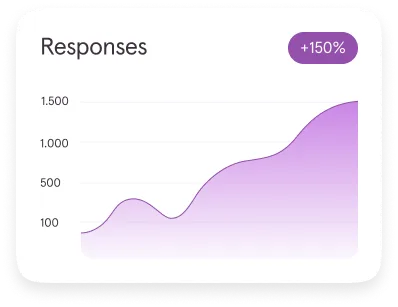
So, how do you do that? Design interactive and engaging surveys that leverage conditional logic to personalize the experience. Typeform makes it effortless to do both:
Typeform's interactive event surveys include a mix of engaging elements, like:
- Question types
- Branching and logic
- Personalization
All designed to keep survey-takers engaged.
Typeform also lets you use recall to create a more tailored experience, add media—like images and video—and ask one question at a time to create a conversational flow that keeps attendees moving through your survey.
Better post-event feedback, better events
Gathering not just more feedback—but better—post-event feedback reveals where you can improve or where you should double down.
And it all comes down to asking the right questions, the right way. Use these seven questions and create an interactive and powerful event feedback survey with Typeform.
Want some inspiration? Start with this template.
Liked that? Check these out:
.webp)
Opinions and Expertise
The rise of adaptive, momentum-driven journeys (and the fall of the static funnel)
Human behavior isn't a neat funnel—it's a constellation of scattered but connected moments. Adaptive, momentum-driven journeys act on these moments in real time to deliver a customer experience that naturally drives conversions. That's why they're replacing the familiar but dead static funnel.
Read more

Opinions and Expertise
Customer flows, not funnels: Why marketers are rethinking how customers move
Marketing funnels assume customers move in straight lines—but they don't. Customer flows use automated workflows to build momentum, with one action triggering the next. See how Typeform Contacts & Automations helps you meet customers where they are, automatically.
Read more
